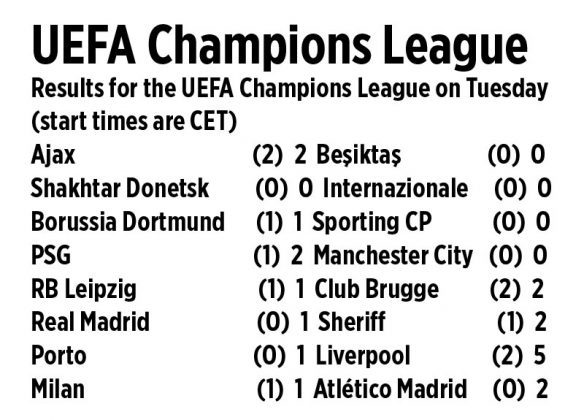UEFA Champions League: Real Madrid stunned in 2-1 home defeat by Moldovan Sheriff Tiraspol

MADRID — Real Madrid slumped to a 2-1 defeat by Moldovan side Sheriff Tiraspol in the Champions League on Tuesday as the visitors pulled off one of the biggest shocks in the competition’s history with a stunning 89th-minute strike from Sebastien Thill.
Champions League debutants Sheriff went ahead against the 13-times European champions in the 25th minute with a header from Uzbek midfielder Jasurbek Yakhshiboev, who narrowly missed a chance to double their lead later in the first half.
Real dominated in both halves, but needed a penalty to level. Karim Benzema buried his spot-kick in the 65th after Vinícius Júnior was felled and awarded a penalty following a VAR review, having been denied after a previous review moments earlier.
Real substitute Luka Jović spurned a great chance to score, but Sheriff quickly went down the other end and following a throw-in the ball fell to Luxembourg midfielder Thill, who unleashed a lethal shot into the top corner on the half volley.
Sheriff, from the unrecognized breakaway state of Transnistria, top Champions League Group D with six points from two games while Real are second with three.
Thill’s unstoppable strike gave Sheriff a win that flew in the face of match statistics showing Real had 30 shots on goal to the visitors’ four and won 13 corners compared to none for the Moldovan side while the Spaniards had 67% of possession.
“I’m a little sad as I think we deserved to win,” said Real coach Carlo Ancelotti.
“You could say we had bad luck, we lost the game on the small details, they scored their goals on the counter-attack and from a throw-in. We had a lot of shots at goal, but sometimes luck deserts you in games.
“Everything went well for them, everything went wrong for us.”
BIGGEST RESULT
Sheriff came through four rounds of qualifying to become the first Moldovan team to play in the group phase of Europe’s elite club competition and surprised a highly experienced Champions League side in Shakhtar Donetsk to win their opening game 2-0.
Before kickoff, the club, founded in 1997, had a mere 6,000 followers on Twitter, contrasting with Real’s army of over 38 million on the social media platform.
They faced an unbeaten Real side and were outplayed for most of the game, but pulled off the biggest result in their 24-year-history, making the most of few chances and relying on some top-drawer saves from Greek goalkeeper Georgios Athanasiadis.
Real made a strong start and Vinícius and Benzema each went close to giving them the lead, Athanasiadis making the first of many saves to tip a stinging shot from Benzema over the bar.
But Ancelotti’s side were outdone on the counter when Cristiano tore down the left wing and crossed to the unmarked Yakhshiboev, who headed into the net.
Real continued to threaten, Benzema and Vinícius each fizzing shots just off target before half time although Yakhshiboev could have scored again down the other end following a glaring error from home keeper Thibaut Courtois.
The Spaniards looked set to go on to win the game after Benzema leveled from the spot, but Sheriff had the ball in the net again through substitute Bruno, although the goal was ruled out for offside.
Luka Modric was then thwarted by Athanasiadis, who saved a thumping shot from the Croatian with his face, before Brazilian forward Rodrygo fired narrowly over the bar.
A Real winner looked inevitable, but instead it came down the other end when Thill tried his luck from the edge of the box, scoring the most important goal in his club’s brief history.
“We had so many shots, their goalkeeper made a lot of saves and I think you have to congratulate them for scoring two goals,” said Real midfielder Casemiro. “We were in control of the game, had many chances and then they scored a wonder goal.” — Reuters














